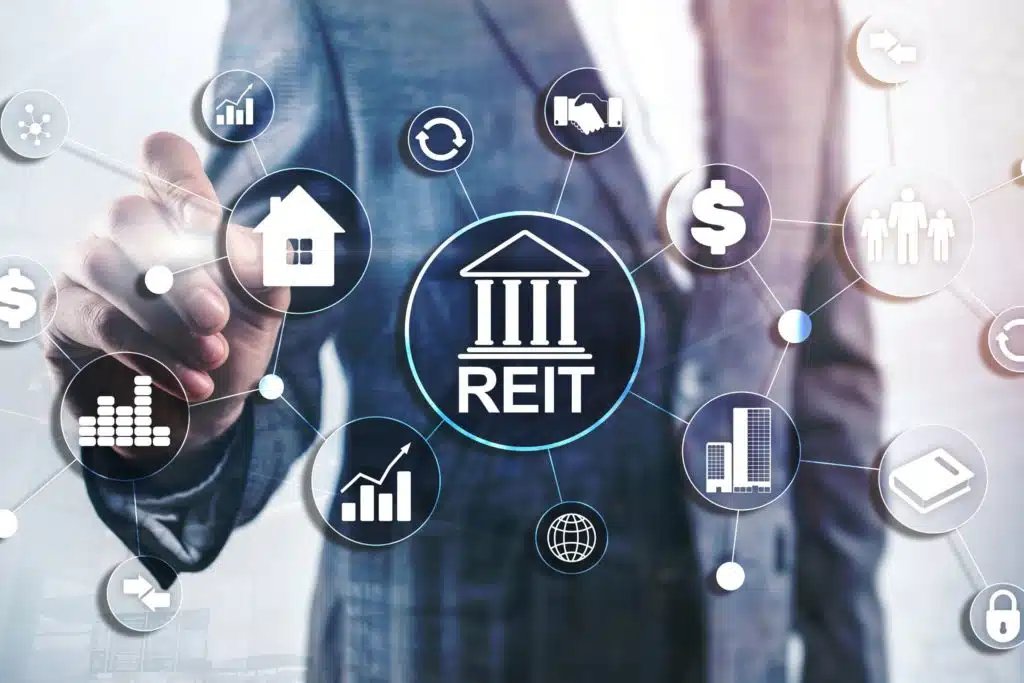| I’ve been investing with Fundrise since 2018. Disclosure: when you sign up with my link, I earn a commission. All opinions are my own. |
Is it possible to invest in real estate with no money? If you watch “how-to-get-rich-in-real-estate infomercials” on TV and the Internet, everyone and their dog seems to be getting rich doing just that – but can you believe them?
You can invest in real estate with little to no money upfront, but it’s more complicated than the promoters make it seem, and you’ll need to be patient. Real estate isn’t a get-rich-quick scheme.
What you won’t find here are exotic real estate investment strategies, like fixes and flips, which require a lot of capital and are more sophisticated than HGTV programs would have you believe.
Table of Contents
- Physical Real Estate Investing: Four Things to Consider
- How to Invest in Physical Real Estate With No Money
- 1. FHA Mortgage With Down Payment Assistance
- 2. FHA Mortgage With a Gift
- 3. Conventional Mortgage With a Gift
- 4. Borrow the Down Payment From Your 401(k)
- 5. Buy With a Home Equity Line of Credit (HELOC)
- 6. Lease With the Option to Buy
- Risk Factors of Investing in Real Estate With Little to No Money
- Alternative Real Estate Investments
- Real Estate Investment Trusts (REITs)
- Real Estate Crowdfunding
- Final Thoughts: Investing in Real Estate Without Cash
Physical Real Estate Investing: Four Things to Consider
Shopping for a mortgage? Credit score and a verifiable income source are critical factors often glossed over by the “get-rich-in-real-estate” fraternity.
Here are four qualifiers for investing in physical real estate, whether you have a large down payment, a small one, or no down payment at all:
1. Sufficient income to carry the mortgage payment.
2. Stable employment/income.
3. Good to excellent credit.
4. Lenders may require “cash reserves” on multifamily properties.
All four qualifiers should be in good working order if you plan to purchase a physical property.
For example, you might get by with an average credit score, but your likelihood of approval will be higher with good to excellent credit. And the higher and more stable your income, the more easily you can qualify for financing.
Credit score and a verifiable income source are critical factors often glossed over by the “get-rich-in-real-estate” fraternity.
Also, lenders are more cautious when financing investment properties and multi-family homes. Lending requirements are more rigid than if you are purchasing a single-family principal residence.
They will ensure you have sufficient income to qualify for the financing you need, the source is stable, and you have good or excellent credit. If not, build your credit score as the first order of business.
How to Invest in Physical Real Estate With No Money

If your income and credit are in good shape and depending on your situation, you may be able to use one of the following six methods to purchase real estate with no money.
1. FHA Mortgage With Down Payment Assistance
FHA mortgages are not available for investment properties. But you can purchase a 2 – 4 family property with a down payment of just 3.5% of the purchase price. That’s $17,500 on a $500,000 property.
And if you qualify for down payment assistance, you won’t need any money upfront.
Every state has down payment assistance programs, and the specific terms and requirements vary with each program. But regardless of where you live, your income will need to fall into a specific range.
For example, their requirements may be that your income cannot exceed the median household income for the area (or a percentage of the median, like 150%.)
In most cases, down payment assistance doesn’t need to be repaid as long as you live in the property for a minimum time period. You must be an owner-occupant to qualify. Unfortunately, some down payment assistance programs may limit availability to single-family, owner-occupied properties only.
2. FHA Mortgage With a Gift
Even if you can’t qualify for down payment assistance, FHA will allow you to make a down payment with a gift from a family member. You can get 96.5% financing on the first mortgage, with the remaining 3.5% coming from the gift. You won’t need to provide any funds out of your own resources.
3. Conventional Mortgage With a Gift
If purchasing a 2 – 4 unit property using a conventional mortgage, you will generally be required to provide at least 5% of the purchase price out of your own funds. But if your down payment is 20% or more of the purchase price, the entire down payment can come from a gift.
The gift strategy will only work if you occupy one of the units. If you are purchasing a property strictly for investment purposes, the lender may require you to provide the entire down payment from your own resources.
4. Borrow the Down Payment From Your 401(k)
One of the fundamental rules of first mortgage lending is that you can’t borrow money for the down payment because lenders are trying to avoid 100% financing strategies and the risks they present to lenders.
For example, you can borrow against your employer-sponsored 401(k) program to cover the down payment. Under IRS regulations, you can borrow the lesser of 50% of the vested value of your plan, or $50,000. Check with your employer to see if your plan permits loans, as employers are not required to offer them.
401(k) loan proceeds can be used in connection with either an FHA or a conventional mortgage.
Note: Since a 401(k) loan is secured, lenders will generally not count the payment against you for income qualification purposes.
5. Buy With a Home Equity Line of Credit (HELOC)
You must be a homeowner with substantial home equity to use this option. And some HELOC lenders may prohibit using HELOC proceeds to buy an investment property. If you plan to go this route, check with the lender first to ensure no such restrictions apply.
Similar to a 401(k) loan, a HELOC is a secured loan and an acceptable source of funds for a down payment. However, unlike a 401(k) loan, the lender will count HELOC loan payments against you for income qualification purposes.
But if you have equity, this is one of the best ways to avoid using cash for a down payment on a second property.
6. Lease With the Option to Buy
The option of leasing a property before buying is not a standard form of home financing, though it does exist. However, it requires two willing parties and a unique purchase contract for each transaction.
Generally, a lease purchase involves signing an agreement to rent a property for a specific period. It’s usually longer than one year and could be five years or more.
Essentially, the longer-term lease allows you to purchase the property before the lease expires.
The contract will include a specific purchase price, which you can exercise before lease expiration.
An advantage of a lease with the option to buy is that you can lock in today’s price on the property and purchase it several years in the future when it may be worth more. And if the property value declines, you can simply let the lease expire without ever making the purchase.
There are drawbacks too. For one, since you’ll be tying up the property for several years, with the owner/landlord agreeing to lock in the price, you may be required to make a larger deposit on the lease.
But I’ve also seen lease options that allocate a certain percentage of your monthly rent to the deposit. It’s possible that the applied rent payments will cover the entire deposit by the end of the lease term.
6 Methods to Invest in Physical Real Estate With No Money
| Method | Key Points |
|---|---|
| 1. FHA Mortgage With Down Payment Assistance | • Purchase 2-4 Unit Property With 3.5% Down or $0 Upfront With Assistance • Income Limits Apply, Owner-Occupancy Required |
| 2. FHA Mortgage With a Gift | • Get 96.5% Financing With a 3.5% Down Payment Gift • No Personal Funds Needed, Owner-Occupancy Required |
| 3. Conventional Mortgage With a Gift | • For 20% Down, Gift Funds Can Cover It • You Need 5% Personal Funds for 2-4 Unit Properties, and Owner-Occupancy Is Required |
| 4. Borrow from 401(k) | • Secure Down Payment by Borrowing Up to 50% or $50,000 • No Impact on Income Qualification |
| 5. Home Equity Line of Credit (HELOC) | • Requires Substantial Home Equity • Check for Investment Property Restrictions • HELOC as Secured Down Payment, With Payments Impacting Income Qualification |
| 6. Lease With Option to Buy | • Lease with Purchase Option, Lock in Price • May Need a Larger Deposit • Rent Payments May Cover It • Advantages in Potential Property Value Gains |
Risk Factors of Investing in Real Estate With Little to No Money

Investing in real estate with no money is possible – but it won’t be easy!
As you can see, there are multiple ways to invest in real estate with no money. But you must be aware of the limitations that come with that strategy. Here are some other considerations you will need to make.
1. Any No-Money-Down Investment Is a High-Risk Proposition
Zero equity means you have zero margins for error. That can become a serious problem if you purchase a house that declines in value. Also, the more you finance, the higher your monthly mortgage payment.
2. You Need an Emergency Fund
If you have a property with tenants, things will break and need to be fixed or replaced. That will cost money. You’ll want an emergency fund in place upon closing to be ready for contingencies.
3. You May Be Susceptible to High-Interest Rates
High-interest rates are a reality in 2024. If you purchase a home with little to no money down, you may be at risk if mortgage rates suddenly rise. This is especially true for anyone living on a tight budget who can’t afford an increase in their mortgage payment.
4. It’s Helpful if You Are Handy
You don’t need to be able to renovate a property by yourself. But you’ll save a lot of money if you can handle most routine repairs yourself. Otherwise, you’ll go broke paying for repairs and maintenance.
5. Always Get a Home Inspection Before You Buy
During the housing boom of 2020/2021, a lot of new home buyers skipped this step. Many markets were so hot buyers were afraid to ask for one. And many sellers were turning away offers that asked for it.
It doesn’t matter how much demand there is; never skip the home inspection; it should be near the top of your home buying checklist.
A home inspection is your one and only chance to find out “what’s under the hood” of the house. Fail to get the inspection, and any undetected problems will immediately become yours as of the day of closing.
Key Risk Factors When Investing in Real Estate with Little to No Money
| Risk Factors | Description |
|---|---|
| High-Risk Proposition | Zero Equity Means Little Room for Error; Financing More Increases Monthly Payment Risks |
| Emergency Fund Essential | Properties with Tenants Need an Emergency Fund for Repairs; Be Financially Prepared at Closing |
| High-Interest Rates | Low or No-Money Down Deals May Expose You to Sudden High-Interest Rates, Impacting Your Budget |
| Handy Skills Helpful | Save Money by Handling Routine Repairs; Otherwise, Maintenance Costs Can Strain Finances |
| Home Inspection Vital | Always Inspect Before Buying to Uncover Potential Issues, Preventing Surprises Post-Closing |
Alternative Real Estate Investments

Did you know? You can invest in real estate without owning physical property and all the risks and hassles of property ownership or being a landlord. Here are two alternative real estate investments that let you start with less than $1000.
Real Estate Investment Trusts (REITs)
REITs are kind of like mutual funds that invest in commercial real estate. When you purchase units of a REIT, you are buying a small slice of ownership in office buildings, retail space, apartment complexes, and even medical or educational facilities.
REITs are designed primarily to provide income, which is paid as dividends. They are legally required to return 90% of all net revenue to shareholders. But you also have the opportunity for capital gains whenever underlying properties are sold at a profit.
REITs can be bought and sold through investment brokers like TD Ameritrade. They can generally be purchased for one share (or less) and are usually traded as easily as stocks.
Where to Buy REITs
One of the easiest ways to get started with REITs is through an exchange-traded fund(ETF). REIT ETFs are low-cost, provide diversification across the real estate asset class, and like individual REITs, offer attractive dividend yields. If you’re interested in purchasing REIT ETFs, I recommend M1 Finance.
M1 Finance is a robo-advisor platform that uses a pie-investing approach. You can create your own “pie” with a mix of individual stocks and ETFs. For example, you could hold 3 ETFs in a single pie, one of them being a REIT ETF. For more information, check out my full M1 Finance review.
Real Estate Crowdfunding
Real estate crowdfunding allows you to invest through online real estate platforms. You can invest in everything from non-publicly traded REITs to individual properties. Minimum investments range between $10 and 20% or more of the down payment on an individual property.
Some real estate crowdfunding platforms require accredited investor status. That means you must show minimum income and asset levels to qualify (and they’re steep!). However, there are plenty of platforms that do not require accredited status.
Real Estate Crowdfunding: Where to Invest
One prominent example is Fundrise. With a minimum investment of $10, anyone can invest in non-publicly traded REITs. They have low fees and different plan levels for investors with more capital.
If you are an accredited investor, consider RealtyMogul. With a minimum investment of $5,000, you can begin investing in individual properties. These are some of the most profitable investment deals in the real estate crowdfunding space. Learn more in my RealtyMogul review.
Final Thoughts: Investing in Real Estate Without Cash
As you can see, there are plenty of ways to invest in real estate with no money. But real estate investing carries plenty of risks, especially if you buy physical real estate. That’s why it’s critical that you do the proper research upfront. Once you do, if you’re not quite ready to jump into the real estate market, consider starting with individual REITs or a REIT ETF, and build from there.








